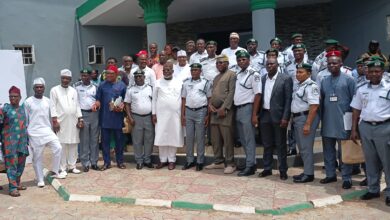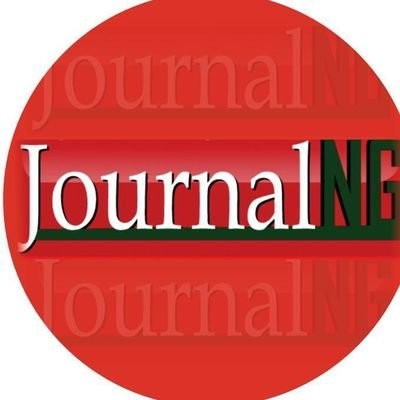

Ahead of the aviation security workshop to hold in Abuja,the Nigeria Civil Aviation Authority (NCAA) has brought together stakeholders in the industry to discuss ways of improving the safety of passengers ,cargo and the airport environment.
The aviation industry facilitates global connectivity and serves as a catalyst for commerce, cultural exchange and economic development.
These opportunities come with threats of cyberattacks, terrorism, insider-threats, unmanned aerial systems which causes insecurity of cargo, passenger and the airport environment.These attacks against civil aviation can be countered by the Implementation of effective aviation security measures and procedures, by competent personnel.

Therefore, to strengthen security and foster collaboration in the aviation industry , the Director General of Nigeria Civil Aviation Authority (NCAA) Chris Najomo , ordered that from October 1, 2025, all aviation security personnel in Nigeria undergo the basic 123 Aviation Security (AVSEC) course as a baseline training and certification for all aviation security screeners and develop and implement measures to protect the critical information and communications technology systems and data from unlawful interference.
The DGCA gave the order during the aviation security stakeholder symposium held in Lagos recently.The symposium was themed ” The Fundamentality of Security in Achieving the Safe Skies Goal” and it was beyond a mere academic exercise or just an exchange of ideas.It was a veritable avenue for strategic collaboration, innovation, and proffering real actionable solutions.
He stated that the provisions of Standard 3.4.1 of ICAO Annex 17 have been included in the National Civil Aviation Security Training Programme (NCASTP) and the objective is to ensure that aviation security personnel involved in implementing various aspect of the NCASP are adequately equipped with necessary knowledge, skills and competencies so as to be able to effectively implement aviation security preventive measures in accordance with appropriate National and Airport Security Programmes as prescribed in the civil aviation security standards and recommended practices.

Najomo added that this directive shall apply to all Aerodrome Operators Aircraft Operators, Air Traffic Service Provider, Cargo and Mail Providers, Ground Handling Providers, Catering Providers, Aviation Security Service Providers and other Aviation Allied Service Providers.
He reiterated that there’s no room for unruly passenger behavior. He said the NCAA will not hesitate to deal with uncompliant air passengers
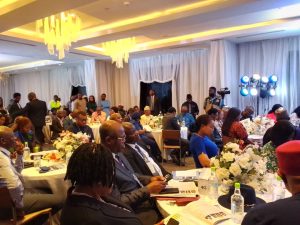
“All stakeholders under the NCASP are required to implement the Basic STP 123 course as a baseline training for all security personnel before deployment for aviation security duties.Section 3 of the National Civil Aviation Security Certification Programme (NCASCP), stipulates that all aviation security persons assigned responsibilities for the screening of person, baggage vehicle and other items are required to undergo certification processes.
“In accordance with the provisions of Part 17.59 of the Nigeria Civil Aviation Regulation and Section 6.12 of the NCASP, all entities involved with, or responsible for the implementation of various aspects of the NCASP are required to identify their critical information and communications technology systems and data used for civil aviation purposes.
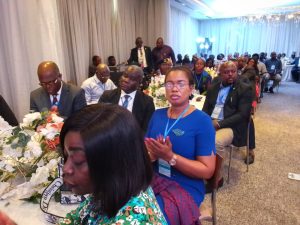
“The measures shall include, inter alia, security by design. supply chain security. network separation, and the protection and/or limitation of any remote access capabilities, as appropriate and in accordance with the risk assessment carried out by its relevant national authorities. The Authority has published guidelines for the aviation cybersecurity as prescribed in Appendix Y to the NCASP of 2024, which provides guidance on implementation of the aviation cyber security. ”
“There’s nothing like any governor’s friend.If you’re unruly, you will be dealt with accordingly. You cannot go abroad and maintain yourself and start misbehaving when you come to Nigeria.NCAA will not accept that.”,he said.
Olubunmi Kuku, the Managing Director/Chief Executive of the Federal Airports Authority (FAAN) emphasised that commitment to reinforcing aviation security must be steadfast and adaptive in an era marked by evolving threats and rapid technological advancements.
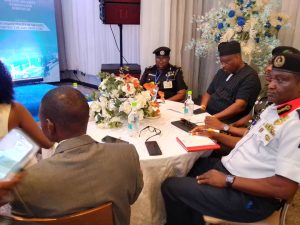
“Our commitment to this critical aspect of aviation will undoubtedly contribute to the safety and security of passengers, crew members, and the general public.”, she said.
Former Director General of the Nigeria Civil Aviation Authority (NCAA) Harold Demuren , said continuous collaboration and cooperation between aviation security personnels and private security providers will improve the security in the aviation industry.He added that these security personnels need to undergo trainings to upgrade their operations.
According to him, “Air Force, Nigeria Customs Service, Nigeria Immigration Service, National Drugs Law Enforcement Agency ,Nigerian Police Force, and all our private security providers, must work together to achieve the safe skies that we desire.We have to avoid rivalry.”

Amasa Peter, General Manager ,Aviation Security, NCAA who spoke on the topic ” Aviation Security Implementation in Nigeria: Challenges and prospects” listed challenges facing the aviation security system as poor maintenance of equipment, limited Closed Circuit Television (CCTV) coverage and insufficient biometric access, poor perimeter security, lack of inclusion detection system, insufficient lighting around airport perimeter, shortage of skilled personnel ,limited career development opportunity, non-compliance with International Civil Aviation Organization (ICAO) standard, poor interagency coordination, overlapping roles and inadequate funding .
He suggested that there should be regular threat assessment in collaboration with security agencies and other partners both at the local and international level while adding that advanced personnel vetting profiling should be implemented.
“Maintaining the equipment is a great problem, it’s a challenge to implementing aviation security in Nigeria. Our fences are very weak.All these creates security vulnerabilities.The Aviation Security (AVSEC) officers are not properly trained and they lack exposure.Today, we have lack of interagency collaboration and security threats are not always communicated.Everybody wants to see your passport.
“There is a need to update our legal framework. We have issues with Civil Aviation Act. There should be continuous review and amendment of aviation security laws. To align with evolving global threats and ICAO standard.We need stronger enforcement mechanism and introduce stricter penalties for breaches of aviation security protocols and criminal activities at the airport. For improved AVSEC , there should be technological advancement deployment and modern scanning.

Chairman of Air Peace Airline Limited, Allen Onyema reaffirmed Air Peace’s commitment to collaboration and aviation excellence.He described the symposium’s theme as both timely and pressing as he gave recent instances of security challenges recently faced by the airline. He emphasized on Aviation Security synergy.
“Our passengers deserve nothing less, and our future as an aviation nation depends on it.Aviation security is not just protocol, it’s the industry’s lifeblood.No agency or operator can do it alone. Airlines, airport authorities, security agencies, regulators, and private sector partners must work in concert.






